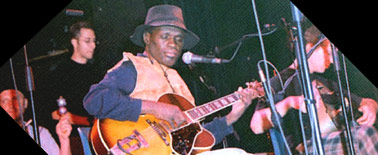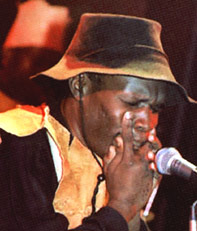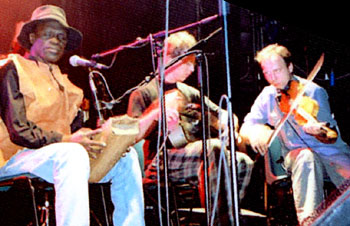
BAFA © 2010. All material here is copyrighted. See conditions above. |
  Edel'Akongu Ekodelele Eyperu Edel'Akongu Ekodelele Eyperu
singer, songwriter, guitarist, Uganda
Based on an interview by email with
Sonja van Kerkhoff, 2002.
Edel' died in December 2002.
"Big Five" consists of nine musicians and we play fusion, combining our traditional melodies and rhythms with modern arrangement and instruments.
We usually transfer a local instrument to the appropriate corresponding modern instrument.
|
For example a xylophone to a piano, a local tube fiddle to a violin. Although we also involve the local instruments on stage as rhythm drivers for authenticity. I play the akoogo or thumb piano, the acoustic and electric guitar and sing in my local language Ateso. So we play both western and traditional instruments.
|
 Our program is influenced by two of Ugandas traditional cultures. Juliet Ssesanga (lead singer and choreographs the traditional dances), Godfrey Lubulwa (keyboards and namunjoloba drum), and John Bosco Mayega (bass guitar and engalabi drum), are from Buganda, central Uganda, which is from the Bantu group of tribes, while I am from the Teso tribe, in the north-east, which is from the Nilo Hamitic group of tribes that originated from the horn of Africa.
Our program is influenced by two of Ugandas traditional cultures. Juliet Ssesanga (lead singer and choreographs the traditional dances), Godfrey Lubulwa (keyboards and namunjoloba drum), and John Bosco Mayega (bass guitar and engalabi drum), are from Buganda, central Uganda, which is from the Bantu group of tribes, while I am from the Teso tribe, in the north-east, which is from the Nilo Hamitic group of tribes that originated from the horn of Africa.
|

|

|
The two cultures have radically different cultures and languages. The Kiganda music is percussion driven and show orientated with highly specialised dances. It is made of differently timed rhythm patterns bouncing off each other to produce a sophisticated rhythm. The music from Teso is more baladish and rocky with sweet melodies. It is played on a number of thumb pianos of varying sizes covering three octaves or so and is a sound around which the community parties and lay bare their hearts.
|

The first CD by Big Five (Juliet Ssesanga (lead vocalist and choreographs the traditional dances), Godfrey Lubulwa (keyboards and namunjoloba drum), and John Bosco Mayega (bass guitar and engalabi drum), Edel (akoogo or thumb piano, acoustic and electric guitar, and lead vocalist).
|
This gives our group two distinct faces which are clearly decernable when you listen to our first cd "Echoes of Kampala". In the begining it was destabilising as we struggled to merge the two faces into one, but now we have finally settled for the idea that two faces is richer than one, and can complement each other.
Our songs are about everyday life issues like the one I wrote called "Homesick". It is about the effect of the civil war on our way of life I miss our traditional food, the freedom to explore, and all my childhood delights.
Another song I wrote is about looking at today's music through the eyes of one of my uncles from the rural area. His comment is that modern music sounds gwala gwal, like metal bottle tops being shaken in a bag.
Uganda is a hot bed of a multitude of cultures and traditions emanating from about four different ethnic groupings: the Bantu, the Hermites, the Nilo Hermites and the Nilotics. Each of these consist of five or more ethnic groups each with its own different traditions, language, music and all. This makes it difficult for Uganda to have one single cultural identity. At the advent of colonialism and the subsequent partition of Africa, all these ethnic groups were bound into one single nation using a common system of administration and English was established as the language of learning and cross culture communication. The demonisation of the local traditions by the British colonial masters, the lack of interest and support by subsequent governments, have left the Ugandan cultural scene deeply polarised along the two tiers.
|
At the local level we have the traditional music stuck at a particular point in time. At the other level the young having been cut off by a predjudiced education system, finding themselves unable to connect with their traditional roots.
At the national level you find the educated from all the different groups living in the urban centers and comunicating in English. At the local level you have the indigenous groups living within the walls of their traditions. It is slowlly becoming evident that, each of these two groups is beginning to feel the evolutionary void separating them, and are struggling blindly to do something about it.
However with the electronics media pumping slick material from other well developed cultures deep into the bossom of society, the picture is frightening. Suddenly people from both tiers are begining to grab at this new material to fill the void in them. It will only be a matter of time before traditional music will be no more, replaced by the contemporary modes from the western cultures.
This is the background upon which the Big Five group operates. We were kind of brought together by our common dislike of the trend local contemporary music was taking. You can just hear third rate Jamaican, American, Congolese music twisting the local languages out of context. So anchored upon our traditional roots we are reaching out into the contemporary, which will enable us to express ourselves in the tone of today without destroying our roots.
Our band's aim is in establishing a contemporary aspect to some of Ugandas' beautiful music.
We were all like rolling stones (not the American group!) until somehow we met each other and started the group way back in 1991. At first it did not seem serious and our friends laughed at us. Commercial success even now, is still a myth.
Then Sten Sandahl a producer for the Swedish Concert Institute came to Kampala looking for material both traditional and contemporary. With the traditional stuff that was easy, but then all the contemporary stuff had no relation at all with the traditional material. When he listened to us he decided to take us on and the result was our first CD "Echoes of Kampala". We currently enjoy the status of the gateway to the music of Uganda. We have hosted two groups from England so far, Fernhill and the Katherine Tickel Band, we have also hosted Deishovida (www.deishovida.com) from Austria resulting in the Austrian tour we did in October 2001.
Our biggest challenge now is exposure, the Austrian tour proved to us that what we have works. Our focus is that of bridging the cultural evolutionary gap -- in our case, the gapping hole between the traditional and the contemporary. The world has a lot to lose if all these beautiful melodies and rythms are lost.
Arts Dialogue, November 2002, page 7. Edel died in December 2002 in Kampala.
African Cultures in a time of change
....(will be typed up when someone volunteers to do this - in the meantime...).
...In 1989 Edel' won the contemporary class of the East African Music Festival, organised by the Councillors of Africa with his song, "Children of Kampala".
Two other festivals were also organised Western and Central Africa as well.
At the East African festival there were participants from Uganda, Kenya, Tanzania and Malaysia. It is hoped that this will become a regular event.
Of his own work Edel' writes: "I am currently engaged in marrying traditional African rhythms with western arrangement and facilities. I've been at it for the last eight years or so and it is only now that I begin to make head or tail of it all. It is a most exhilirating experience using Western arrangements to explore the hidden crevices of the mystic African rhythms. I play cabaret at one of the hotels in town with another person, more to make ends meet than anything else."
He is currently working on a demo tape of his own music and is also looking for funding for a project to make a documentary video, which aims to present contemporary and traditional urnal and rural aspects of Ugandan music, both as a form of support for the artists themselves as well as a general educational source...
Excerpt from the BAFA newsletter, April 1991, page 6.
|

Arts Dialogue, Dintel 20, NL 7333 MC, Apeldoorn, The Netherlands
email: bafa@bahai-library.com
|
|


 Our program is influenced by two of Ugandas traditional cultures. Juliet Ssesanga (lead singer and choreographs the traditional dances), Godfrey Lubulwa (keyboards and namunjoloba drum), and John Bosco Mayega (bass guitar and engalabi drum), are from Buganda, central Uganda, which is from the Bantu group of tribes, while I am from the Teso tribe, in the north-east, which is from the Nilo Hamitic group of tribes that originated from the horn of Africa.
Our program is influenced by two of Ugandas traditional cultures. Juliet Ssesanga (lead singer and choreographs the traditional dances), Godfrey Lubulwa (keyboards and namunjoloba drum), and John Bosco Mayega (bass guitar and engalabi drum), are from Buganda, central Uganda, which is from the Bantu group of tribes, while I am from the Teso tribe, in the north-east, which is from the Nilo Hamitic group of tribes that originated from the horn of Africa.

